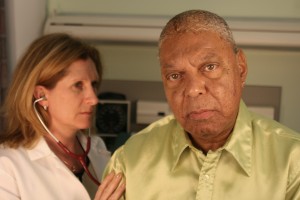
What will it take to ensure that all physicians are competent to care for their large and growing numbers of older patients?
Despite being only 13 percent of the population, older adults (those over 65) are big users of health care. For example, they make up 35 percent of office visits to the average general internist, 50 percent of visits to cardiologists, and 55 percent of visits to ophthalmologists. Except for pediatricians, all physicians will encounter older adults in their practice. But medical training does not reflect these demographic and epidemiological realities; standards of medical education do not require geriatric clinical training experiences (clerkships) during medical school. Yet medical education continues to require all doctors in training to treat children and deliver babies, regardless of future specialty.
More than 50 percent of the older adults future doctors will encounter will have multiple chronic diseases, such as hypertension and heart disease. Some unknown but significant number (> 15%?) will have cognitive impairment that limits their ability to take care of themselves, and 25% will have impairments in some activities of daily living. These factors, along with differences in symptoms, prognosis, and tolerance for interventions, are just some of what makes the geriatric population and its concerns as distinct from younger adults as pediatrics is from general adult medicine.
But, rather than looking at these figures and concluding that geriatric training is therefore a core need of medical education, medical leaders often conclude the reverse. Many think that seeing lots of older patients means that doctors must already be competent in their care. The late Dr. Robert Butler used to dismiss this myth with the observation that caring for lots of older patients no more makes you an expert in their care than caring for patients who have hearts makes you a cardiologist.
A Canadian medical school decided to challenge this myth. They published their results in the July issue of Academic Medicine. Given the opportunity to create a two-week “eldercare clerkship” for some but not all medical students, they seized the chance to test its impact versus usual education by randomly assigning trainees to one versus the other.
Not only did the eldercare clerkship increase trainee knowledge on a multiple choice test, but it also altered rates of passing scores on a simulated patient Objective Simulated Clinical Exam given to all the trainees. Ninety-five percent of students assigned to the eldercare clerkship passed, compared to only 78 percent assigned to the usual training model. If I were a student, I know which group I would rather be in.
However, even this clerkship experience cannot solve everything. The study also showed that attitudes towards older people became more negative across the board, only slightly moderated but not reversed by the intervention. How can this be?
As I see it, medicine has a problem with geriatrics. The patients are too big a share of practice to give up, yet the comprehensive, person-centered care that complex older people need is exactly what the health care system is not designed to do well. Furthermore, doing it for older people is particularly inglorious and sneered at. Geriatrics is an area of practice where getting care right is rare, yet it also makes a tremendous difference to quality of life for patients and families. A well-precepted geriatric clinical training experience in medical school should be part of what teaches future physicians about their potential to make a difference in the lives of older adults.
